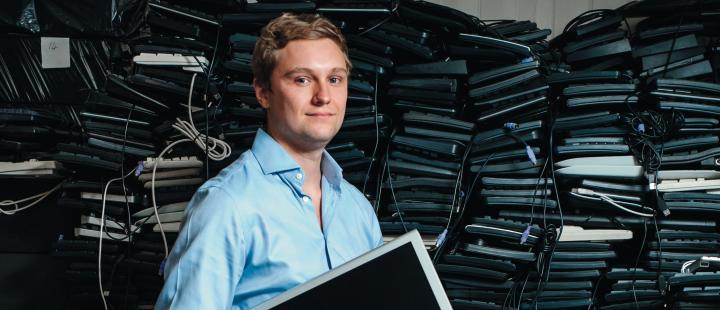Cracking the code to supporting technology in African schools
A charity set up by an Edinburgh student is bringing life-changing technology to classrooms in Africa.

A lack of technology in sub-Saharan African schools has put millions of children at an educational disadvantage. Edinburgh graduate and PhD student James Turing has been working to remedy this through his foundation, the Turing Trust.
Plugging the technology gap
Having first visited Ghana in 2009, James was struck by the lack of technology in school classrooms. Since then he has been working tirelessly to repurpose computers for use in schools across Africa, and has also been working to plug the technology gap.
After gaining his MEng in Structural Engineering & Architecture from Edinburgh in 2015, James is now working towards his PhD in International Development. His research focuses on the circular economy in Kenya, which led to the founding of the Turing Trust and his innovative approach to reusing IT equipment.
“After working in rural African communities for a couple of years, I realised that we weren’t able to support as many schools as we would like, with repurposed computers,” explains James. “Many didn’t have access to traditional on-grid electricity. This led us to establish SolarBerry, which is a solar energy experiment to see what we can do to solve that problem.”
In the past year his efforts have not gone unnoticed. He became one of only 18 students to be awarded a grant from the Clinton Global Initiative (CGI) University Innovation Fund. The fund supports effective, high-impact student innovators and entrepreneurs from around the world.
Ms Megan Strawther, Community Engagement Manager for CGI, explains that the project was chosen for a grant because CGI believed the funds would be implemented thoughtfully and result in significant impact.
“James has consistently demonstrated his reliability, passion for the work, and a willingness to adapt to changing circumstances,” says Ms Strawther. “He is tackling many issues, including lack of digital access within rural communities, the technological gap and, perhaps most significantly, access to educational resources. He has dedicated months of his life to really understanding the needs of these communities and we are confident that through his commitment, these areas will be significantly impacted.”
I’ve been around these schools for nearly seven years and the desire for education is always awe-inspiring.
Working in partnership
As a direct result of the CGI funding, James and his colleagues were able to work closely with communities in Malawi to identify their specific needs. James is conscious that the Turing Trust works with in-country partners wherever possible and that the relationships with these contacts form the crux of their projects.
“Our work isn’t about white saviours going in and distributing things,” he says. “We always work with in-country partners. In Malawi we are working with a charity called the Centre for Youth and Development. These partnerships truly define everything we do and without them we simply wouldn’t have a project.”
“One of the first steps is getting teachers involved,” he continues. “When they get a computer in their school you always find that teachers are some of the happiest beneficiaries. In their free time they can almost be guaranteed to be using the computers and improving their own digital skills, which then trickles down to the students.”
For James the innovative aspect of the work is simply spending time with the communities and making sure that what is being done is actually working effectively: “We want to ensure that the computers stay working for the next five years or longer; that’s our aim.”
James hopes that the work of the Turing Trust will enable people from rural areas to catch up with their urban counterparts and create an equal distribution of digital opportunities.
“I’ve been around these schools for nearly seven years and the desire for education is always awe-inspiring,” he comments. “The conditions are extremely basic for many children. You don’t think we live in a world where poverty is so endemic but people are genuinely malnourished. With education you sometimes think you’re leapfrogging too far and that the focus should be on food rather than computers but we hope that our work can help improve circumstances in these communities.”
With his PhD work overlapping with the work of the Turing Trust, James is clearly grateful for the support his supervisors have offered him in the past few years. The University supported the Trust’s efforts in a more practical way too: “Our workshop was based in High School Yards for the past two years and we would not have achieved so much if we didn’t have that backing,” comments James. “During that time we grew from delivering a few hundred computers a year to delivering 1,500 a year. We’ve crossed a hurdle thanks to the University’s support.”
A legacy of education
James founded the Turing Trust in honour of his great uncle, the computer scientist and World War II code-breaker Alan Turing. His uncle’s legacy is kept alive by James’ work with the Trust. Alan Turing wanted technology to be available to all and was keenly aware that the underprivileged in the world require support.
“One of the lesser-known things about Alan was his charitable philosophy and the fact that he sponsored a refugee through higher education throughout his life,” reveals James. Turing helped a young Jewish refugee from Vienna who arrived in the UK in 1939 by securing him a place in a public school and maintaining an interest in his career.
“When Alan was developing aspects of computing, he would never have wanted access to be restricted to only the wealthiest people in the world,” says James. “Alan undoubtedly would have wished his technology and work to be shared the world over, which is what we are trying to do with the Turing Trust.”
Photo © Callum Bennetts, Maverick Photo Agency

